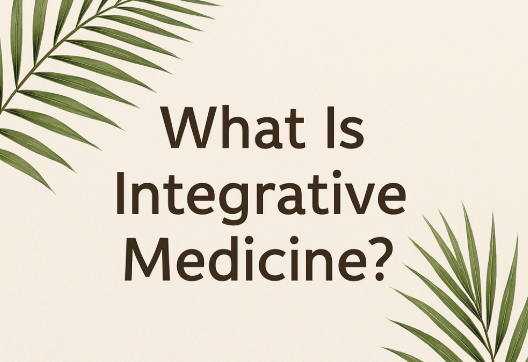
Integrative medicine is an approach to healthcare that combines the best of conventional medical treatments with evidence-based complementary therapies, focusing on healing the whole person (body, mind, and spirit).
Where conventional medicine often centers on disease management, integrative medicine expands the view to also include prevention, lifestyle, and the emotional, social, and environmental factors that shape well-being.
Key Principles of Integrative Medicine
Whole-Person Care
Integrative medicine sees you as more than just your diagnosis or symptoms. It considers your physical health alongside emotional, mental, social, and even spiritual dimensions, recognizing that all these layers are interconnected.
Combining Conventional and Complementary Approaches
Integrative medicine does not reject conventional medicine, but rather, it works alongside it! This might mean using acupuncture to manage pain alongside prescribed medications, incorporating yoga or mindfulness for stress management, or using nutrition therapy to support recovery after surgery.
Personalized Treatment
Like functional medicine, integrative medicine emphasizes that healthcare should be tailored to each individual. What works for one person may not work for another, and treatment plans are designed around personal needs, goals, and preferences.
Emphasis on Prevention and Lifestyle
Integrative medicine puts a strong focus on prevention, using nutrition, movement, sleep, stress reduction, and other lifestyle strategies to keep the body in balance and reduce the risk of chronic disease.
Patient-Practitioner Partnership
In integrative care, the patient is an active partner, not just a recipient of treatment. This approach encourages open communication, shared decision-making, and respect for the patient’s values and beliefs.
What Integrative Medicine Includes
Integrative medicine draws from a broad toolkit, including:
- Conventional medications and medical procedures
- Nutrition and dietary counseling
- Herbal and botanical therapies
- Acupuncture, massage, and bodywork
- Mind-body practices like meditation, yoga, tai chi, and breathwork
- Stress management and emotional well-being support
- Supplements or nutraceuticals (when appropriate)
The key is that all therapies are evaluated for safety and evidence, and they are chosen thoughtfully to complement and not replace appropriate medical care.
Examples of Integrative Medicine in Practice
- Supporting healthy aging and longevity by combining hormone balancing, targeted nutrition, mindfulness, and fitness strategies
- Helping high-performing individuals recover from chronic stress and burnout through acupuncture, adaptogens, meditation, and lifestyle tools
- Providing women’s health care across all life stages, including herbal therapies, stress resilience strategies, and bioidentical hormone support
- Supporting cancer patients with acupuncture, massage, and nutritional counseling alongside chemotherapy or radiation
- Managing chronic pain with a blend of physical therapy, mindfulness, and non-opioid medications
- Addressing anxiety or insomnia with a mix of cognitive behavioral therapy, meditation, and nutritional interventions
- Helping someone recovering from heart disease combine conventional cardiac rehab with stress reduction techniques and anti-inflammatory nutrition
The Bottom Line
Integrative medicine is about combining the best of both worlds with conventional treatments and complementary therapies to promote healing, help drive longevity, and support whole-person wellness.
It’s not about “alternative” medicine or rejecting standard care; it’s about using all appropriate, evidence-based tools to help people live healthier, more balanced lives.